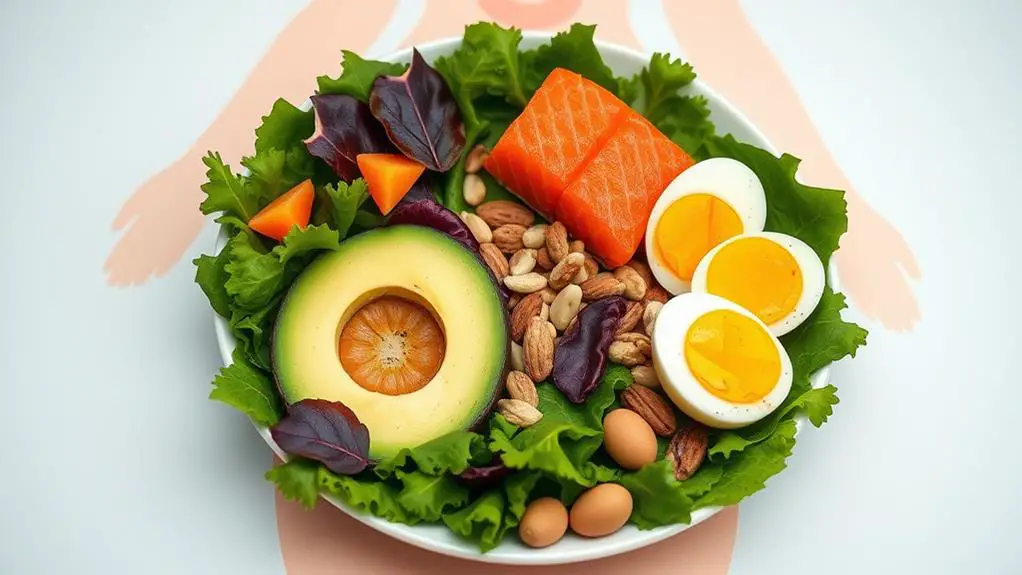
Ladies, if you want to crush your weight loss goals on keto, here's a cool game plan! First, aim for healthy fats like avocados instead of junk food fats. Keep those carbs super low—just 5-10% of your daily calories. Don't forget your veggies, especially the non-starchy ones, for nutrients and fiber. A mix of cardio and strength training three to four times a week is key. Plus, beating stress with yoga or meditation can help keep those pesky cortisol levels down. Track everything with apps to stay on point. Stick around to get the full scoop on rocking your keto journey!
Key Takeaways
- Prioritize whole, unprocessed foods to ensure nutrient density and overall health.
- Monitor macronutrient ratios closely, aiming for 70-80% fats, 10-20% protein, and 5-10% carbs.
- Utilize tracking apps for caloric intake and macronutrient management to maintain a calorie deficit.
- Incorporate a balanced exercise routine with cardio and strength training 3-4 times weekly.
- Manage stress and emotional eating through mindfulness practices and adequate sleep.
Understanding the Keto Diet
The ketogenic diet, often referred to as the keto diet, fundamentally shifts the body's metabolic focus by drastically reducing carbohydrate intake to about 5% of total caloric consumption. This forces the body to enter a state called ketosis, where it burns fat for energy instead of glucose.
While this sounds straightforward, there are many keto misconceptions and variations that can confuse beginners.
One common misconception is that the keto diet means you can eat unlimited amounts of bacon and cheese. While it's true that fats make up about 70-80% of your intake, the focus should be on healthy fats like those found in avocados, nuts, seeds, and oils.
Another variation people often miss is the importance of non-starchy vegetables. These veggies provide essential nutrients and fiber, helping maintain overall health.
Monitoring macronutrient ratios is vital for staying in ketosis and avoiding pitfalls like overeating. Typically, this means around 70-80% fats, 10-20% protein, and 5-10% carbs.
Tracking your individual responses, such as energy levels and hormonal balance, can optimize the diet's effectiveness. This way, you can make adjustments to guarantee sustainable weight loss outcomes.
Prioritizing Nutritional Quality
To achieve ideal results on a keto diet, prioritizing nutritional quality is paramount. Eating whole, unprocessed foods is key because they are nutrient-dense and packed with essential vitamins and minerals. These foods help you stay healthy while losing weight.
Think about it: an avocado is not just a tasty treat; it's a powerhouse of nutrients that your body loves. But be careful, even healthy, high-calorie foods like avocados and nuts should be eaten in moderation. Too much of a good thing can still slow down your weight loss.
Adding non-starchy vegetables to your meals is another smart move. They are low in calories but high in fiber and nutrients, making your meals more filling without adding too many calories.
Imagine a plate filled with colorful veggies—it's like a nutrient parade that keeps you full and happy!
Keep an eye on portion sizes and snacking habits. A handful of nuts is great, but a whole bag? Not so much. Using tracking apps like MyFitnessPal can help you keep your macronutrients in check, ensuring you stay on track with your weight loss goals.
Managing Caloric Intake
While prioritizing nutritional quality lays a solid foundation for a successful keto diet, managing caloric intake becomes the next vital step in achieving weight loss goals.
Understanding how to balance your calories can make or break your progress. Here's how to stay on track:
1. Caloric Tracking: Using apps like MyFitnessPal helps you monitor your daily intake. Aim for about 70-80% fats, 5-10% carbs, and 10-20% protein to stay in ketosis but avoid excess calories. This keeps your body burning fat efficiently.
2. Portion Control: It's easy to overeat calorie-dense keto foods like nuts and avocados. Keeping serving sizes in check is essential. For example, a handful of nuts is enough, not the whole bag.
This guarantees you create a calorie deficit, which is vital for weight loss.
3. Incorporate Veggies: Non-starchy vegetables add essential nutrients and fiber without piling on the calories. Think spinach, broccoli, and zucchini.
They fill you up, making it easier to stick to your caloric goals.
Tracking Macronutrients
Mastery of macronutrient tracking can be the linchpin in achieving ideal results on a ketogenic diet. For effective weight loss, focusing on macronutrient ratios is vital. Specifically, fat should constitute 70-80% of your total caloric intake, while carbs must be sharply limited to just 5-10% to maintain ketosis. This meticulous balance guarantees your body burns fat for fuel instead of carbohydrates.
Utilizing food logging apps like MyFitnessPal can greatly assist in keeping track of these macronutrient ratios. By logging your food intake, you can monitor whether your diet aligns with ketogenic guidelines. Additionally, regularly measuring ketone levels through breath, urine, or blood tests can offer valuable insights into your ketosis status, confirming if you're on the right track.
One often overlooked aspect is keeping track of non-starchy vegetable intake. These veggies provide essential nutrients and fiber, fitting within the low-carb framework of the keto diet.
However, portion control remains paramount; even keto-friendly foods can result in excessive calorie intake if not properly monitored, potentially hindering weight loss efforts. Accurate tracking guarantees you stay within your calorie limits while adhering to the ketogenic principles.
Incorporating Physical Activity
To boost your weight loss on a keto diet, it's important to mix cardio and strength training exercises.
Try to work out at least 3-4 times a week, which helps your body burn fat more effectively.
Plus, lifting weights builds muscle and stops you from losing muscle when you lose weight.
Balanced Exercise Routine
A balanced exercise routine is vital for optimizing the benefits of a ketogenic diet, particularly for weight loss. By incorporating exercise variety and proper recovery techniques, women can improve their overall results and well-being.
Here are three significant elements to include:
- Aerobic Activity: Aim for at least 150 minutes of moderate-intensity aerobic exercise or 75 minutes of vigorous-intensity activity each week. Activities like brisk walking, dancing, or swimming can keep your heart healthy and help maintain the calorie deficit needed for weight loss on a keto diet.
- Flexibility and Mobility Exercises: Including yoga or stretching exercises in your routine can improve recovery and prevent injuries. This not only helps in maintaining a consistent exercise schedule but also promotes relaxation, which can mitigate stress-related hormonal imbalances, such as raised cortisol levels.
- Rest and Recovery: Don't underestimate the power of rest days and recovery techniques like foam rolling or massage. These practices help your muscles repair and grow stronger, ensuring that you can keep pushing yourself without burning out.
Cardio and Strength Training
Integrating both cardio and strength training into a fitness regimen greatly amplifies the weight loss benefits of a ketogenic diet.
First, let's talk about cardio. Doing at least 150 minutes of aerobic exercise each week, like brisk walking or cycling, not only helps burn calories but also improves your heart health. It's essential to find your fat burning zones to maximize these workouts. Interval training, where you alternate between high and low intensity, can be particularly effective for fat loss and keep you motivated.
Strength training is just as important. By lifting weights or using resistance techniques 2-3 times a week, you build muscle. More muscle means you burn more calories even when you're not exercising! Plus, it aids in muscle recovery, so you're ready for your next workout.
Adding workout variety, such as mixing cardio with mobility exercises and resistance techniques, can keep things interesting and improve your endurance benefits.
This variety also helps with exercise motivation, making it easier to stick to your routine. Remember, the key is to stay consistent and enjoy the process. Combining these elements will optimize your keto diet and help you achieve your weight loss goals.
Consistent Workout Schedule
Establishing a consistent workout schedule of 3-4 sessions per week is vital for enhancing fat loss and metabolic health on the keto diet. This not only helps in maximizing fat burning but also supports muscle retention, which is important for women aiming to lose weight.
Mixing up your routine with both cardio and strength training can be a game-changer. Plus, high-intensity interval training (HIIT) is especially effective, boosting your metabolism and promoting fat loss even after you're done sweating.
To keep things interesting and maintain exercise consistency, consider the following tips:
- Set Clear Goals: Knowing what you want to achieve can provide a serious boost in workout motivation. Whether it's losing a few pounds, building muscle, or just feeling more energetic, having a clear target can keep you on track.
- Track Your Progress: Keeping a workout journal or using an app to log your sessions can make a big difference. Seeing how far you've come can be a huge motivator and help you stick to your routine.
- Mix It Up: Trying different types of exercises can prevent boredom. Switch between running, swimming, weightlifting, and yoga to keep things fresh and exciting.
Addressing Psychological Factors
Addressing psychological factors is vital for optimizing weight loss on a ketogenic diet. Chronic stress can raise cortisol levels, leading to weight gain and hindering your keto efforts. Stress management is important, and mindfulness techniques like meditation or yoga can help. These practices reduce stress and improve emotional resilience, making it easier to stick to your diet.
Emotional eating is another challenge. Identifying triggers and developing coping strategies can make a big difference. Self-compassion and positive affirmations can boost your motivation, helping you stay on track. It's also important to prioritize mental health, as anxiety reduction can facilitate better adherence to your diet.
Sleep is key too. Sleep deprivation messes with hunger hormones, causing cravings and overeating. Make sure you get enough quality sleep to support your weight loss journey. Setting realistic expectations, like aiming for 1-3 pounds per week, can prevent frustration and promote sustainable weight management.
Here's a quick summary:
| Psychological Factor | Strategy | Benefit |
|---|---|---|
| Chronic Stress | Mindfulness Techniques, Stress Management | Lower cortisol levels |
| Emotional Eating | Coping Strategies, Self Compassion | Better diet adherence |
| Sleep Deprivation | Prioritize Quality Sleep | Reduced cravings |
| Motivation | Positive Affirmations, Motivation Boosters | Increased adherence |
Addressing these factors can enhance your keto weight loss success.
Considering Medical Conditions

When considering a keto diet for weight loss, it's important to first check for any underlying health issues.
Conditions like hypothyroidism, PCOS, or a history of eating disorders can complicate your journey, so consulting with a healthcare professional is essential.
Additionally, pregnant or breastfeeding women, and those with kidney or liver problems, should avoid strict keto plans to prevent further health complications.
Identifying Underlying Health Issues
Understanding the intricate relationship between underlying health issues and weight loss challenges on a ketogenic diet is fundamental for effective weight management. Women often face unique obstacles on keto, and recognizing potential medical conditions can be a game-changer.
For starters, symptom awareness is significant. Conditions like hypothyroidism can slow down metabolism, making weight loss difficult. If you notice persistent fatigue, weight gain, or hair loss, it might be time for a hormonal assessment.
Similarly, Polycystic Ovary Syndrome (PCOS) can impact insulin sensitivity, requiring diligent blood sugar monitoring to verify your keto diet is effective.
Moreover, chronic stress and depression can raise cortisol levels, hindering weight loss. High cortisol not only affects mood but also promotes fat storage, especially around the belly. Thus, addressing mental health alongside dietary changes is key.
Lastly, nutritional deficiencies from a poorly planned keto diet can worsen existing health issues. Confirming adequate micronutrient intake is essential for overall well-being.
Here are three steps to get started:
- Monitor Symptoms: Keep a journal of any unusual changes in your body.
- Hormonal Assessment: Get your thyroid and insulin levels checked.
- Test for Deficiencies: Verify your diet includes essential vitamins and minerals.
Taking these steps can help optimize your keto journey.
Consulting Healthcare Professionals
Initiating a ketogenic diet requires meticulous planning, particularly for women with underlying medical conditions. If you have conditions like hypothyroidism, PCOS, or a history of eating disorders, consulting healthcare professionals is vital. These dietary consultations can provide personalized recommendations to guarantee that your journey is both safe and effective.
Imagine jumping into a diet without knowing if it will mess with your hormones or heart; that's like diving into a pool without checking the water temperature!
Regular cardiovascular risk assessments and hormone panels are essential. They help identify any potential health issues that the low-carb approach of the keto diet might exacerbate. Your healthcare provider can offer tailored advice on managing risks, like increased LDL cholesterol or hormonal imbalances that can come from rapid weight loss.
Also, if you're on medications for blood sugar control, you definitely need to seek guidance. The keto diet can greatly alter glucose levels and insulin sensitivity.
Overcoming Common Challenges
Successfully maneuvering the keto diet requires addressing several common challenges that can impede weight loss progress. One major hurdle is dealing with keto misconceptions. Many believe they can eat unlimited amounts of high-fat foods like avocados and nuts, but monitoring portion sizes is essential to avoid excessive caloric intake.
Equally, incorporating non-starchy vegetables into meals helps provide key nutrients and fiber while keeping calories in check.
Social challenges also pose significant obstacles. Dining out or attending social gatherings can be tricky, as many occasions revolve around carb-heavy foods. Planning ahead and practicing meal prepping can help mitigate these difficulties, guaranteeing that you have keto-friendly options available.
Lastly, emotional eating can sabotage weight loss efforts. Stress and poor sleep raise cortisol levels, which can hinder weight loss. Addressing these psychological factors is critical. Utilizing stress management techniques like meditation can be beneficial, and establishing a consistent exercise routine can further support weight loss goals.
Here are three tips to overcome these common challenges:
- Track your macros using apps like MyFitnessPal to verify you maintain ketosis.
- Plan and prep meals to avoid social pitfalls.
- Incorporate stress management techniques to combat emotional eating.
Exploring Related Diets

Closely examining related diets reveals several approaches that align with or complement the ketogenic diet, each offering distinct benefits and potential enhancements for weight loss.
One such diet, the Mediterranean, emphasizes healthy fats and whole foods, which provide Mediterranean benefits like nutrient diversity and heart health. It's a great way to balance keto's low-carb focus with a wider range of nutrients.
Fasting techniques, especially intermittent fasting, pair well with keto. They can ramp up fat burning and improve how your body uses energy, making weight loss more effective. Imagine giving your metabolism a little booster shot!
Then there's the carnivore diet, which sticks strictly to animal products. While it matches keto's low-carb approach, carnivore considerations should include the lack of essential nutrients found in veggies and fruits.
The paleo diet, another close relative, focuses on whole, unprocessed foods and can be modified to a low-carb plan, offering similar weight loss perks as keto. These paleo adaptations guarantee you still get crucial nutrients while staying low-carb.
Last but not least, combining keto with fasting mimicking diets can kickstart autophagy, a process that helps your body clean out damaged cells, potentially accelerating weight loss.
Hormonal Impact of Keto
The keto diet can change hormones a lot, especially for women, starting with insulin, which it lowers to help with weight loss.
But there's a catch: less insulin can mean more problems with thyroid hormones, leading to issues like hypothyroidism.
Plus, the stress from the strict diet can raise cortisol levels, making it harder to lose weight and causing fat to stick around the belly.
Insulin and Weight Loss
Hormonal dynamics play an essential role in the effectiveness of the ketogenic diet for weight loss, particularly through its impact on insulin levels.
By drastically reducing carbohydrate intake, the ketogenic diet lowers insulin, a hormone that can inhibit fat oxidation. When insulin levels drop, the body shifts from using glucose to burning fat for energy, making it easier to lose weight.
Women, in particular, may benefit from these changes. Lower insulin levels can help manage insulin resistance, a condition where cells don't respond well to insulin. This is vital for those looking to lose weight and improve their metabolic health.
Additionally, sustained low-carb diets have shown to improve insulin sensitivity, making it easier to manage conditions like type 2 diabetes.
Here are three key points to reflect on:
- Reduced Insulin Levels: Lower insulin helps in breaking down stored fat, enhancing fat oxidation.
- Improved Insulin Sensitivity: This can manage insulin resistance, a common issue in weight management.
- Better Appetite Regulation: Hormonal changes from keto can reduce hunger hormones like ghrelin, making it easier to stick to the diet.
Understanding how insulin impacts weight loss can help women optimize their keto diet for the best results.
Cortisol and Keto Diet
While insulin dynamics are fundamental to the ketogenic diet's weight loss benefits, another hormone, cortisol, also plays a significant role in the dietary landscape.
The keto diet can raise cortisol levels, which is a stress hormone. When cortisol is too high for too long, it can make you gain weight, especially around your belly. For women, this can be a big problem because high cortisol can disrupt hormone balance. This means you might have irregular periods and even face fertility issues.
Now, here's the tricky part: high cortisol can actually make it hard to lose weight, no matter how well you follow your keto plan.
Plus, eating fewer carbs can mess with your thyroid hormones, which are really important for keeping your metabolism and weight in check.
So, what can you do? Cortisol management and stress reduction are key. Pay attention to your stress levels and find ways to manage them, like through exercise, meditation, or even just taking a few minutes to relax each day.
Fertility and Thyroid Health

Steering through the keto diet's impact on fertility and thyroid health requires a nuanced understanding of how low carbohydrate intake can influence hormonal balance. Low carbs can disrupt thyroid function, as glucose is key for making T3 hormones. This can lead to hypothyroidism, weight gain, and other issues.
Moreover, estrogen balance can be thrown off by a keto diet lacking fiber, which is vital for detoxifying estrogen. High estrogen levels can mess with menstrual health, creating fertility challenges for women trying to conceive. Women need to be cautious about micronutrient deficiencies, as these can lead to irregular menstrual cycles and affect ovulation.
To manage hormonal regulation on a keto diet, consider these tips:
- Monitor Thyroid Function: Regularly check thyroid hormone levels to avoid hypothyroidism and guarantee proper metabolic function.
- Balance Estrogen Levels: Incorporate fiber-rich foods to help detoxify estrogen and maintain hormonal balance.
- Address Nutrient Deficiencies: Confirm adequate intake of essential nutrients to support menstrual health and fertility.
For women with conditions like PCOS, a keto diet may improve insulin sensitivity and support weight loss, both beneficial for fertility. Regular monitoring of hormone levels and micronutrient status is essential to maintain thyroid and reproductive health.
Frequently Asked Questions
How Do I Optimize My Weight Loss on Keto?
To optimize weight loss on keto, maintain macronutrient balance with 70-80% fats, 5-10% carbs, and 10-20% protein. Incorporate non-starchy vegetables, monitor portion sizes, and track your intake. Prioritize meal timing, regular exercise, and stress management.
Is It Harder for Women to Lose Weight on Keto?
Yes, it can be harder for women to lose weight on keto due to hormonal fluctuations and metabolic differences. Effective strategies include stress management, personalized dietary preferences, muscle retention exercises, and careful attention to meal timing.
How Do People Lose Weight so Fast on Keto?
People experience rapid weight loss on keto primarily due to glycogen depletion and water loss initially, followed by fat oxidation. However, keto misconceptions often arise, overlooking the role of reduced insulin levels and increased satiety in sustained weight loss.
How Much Weight Can a Woman Lose in a Month on Keto Diet?
On a ketogenic diet, women can expect keto weight loss of approximately 4-8 pounds (1.8-3.6 kg) within the first month, with initial weight loss influenced by glycogen depletion and water loss, followed by steady fat reduction.
Conclusion
In conclusion, optimizing a keto diet for women involves understanding the diet's principles, prioritizing nutritional quality, and managing caloric intake. Tracking macronutrients and incorporating physical activity are key steps. Overcoming common challenges, exploring related diets, and considering the hormonal impacts on fertility and thyroid health are also essential. By focusing on these areas, women can enhance the effectiveness of their keto diet for weight loss and overall well-being.










No Comments